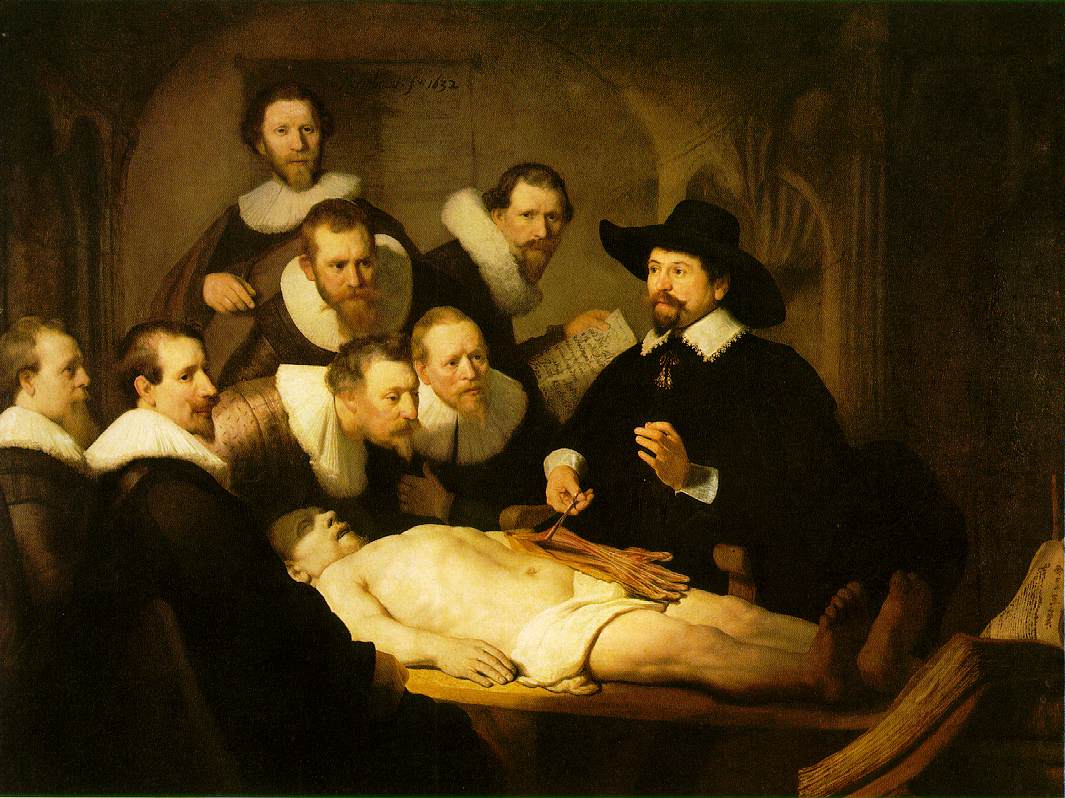So when the day came for my first session, I packed up my bags, grabbed my passport, and joined three of my classmates for a journey over the East River and across the border into Brooklyn. When we arrived at our designated hospital, we met up with Dr. F who herded us into a conference room and began to outline the physical exam on a white board. Now, we've had virtually no meaningful instruction regarding the physical exam, so this brief outline - which contained little more information than can be discerned by an attentive bout with Hasbro's "Operation" - was riveting. But I didn't want to just hear about spleen groping, I wanted to watch it up close. So when Dr. F announced that we were going to hit the wards to meet some patients, I leaped from my chair. I'll get to watch Dr. F listen to stuff! And palpate stuff! Just like they do on tv! And when she finds a patient with an upside-down spleen, Dr. F will turn to us and say, "Now Medical Students, come palpate this upside-down spleen." Then we'll all shuffle over to the bedside to fondle that spleen while we solemnly nod to one another and mutter things like, "that's assuredly upside-down."
So out we walked into the corridors of the hospital, imagining all of the great anatomical oddities that Dr. F would reveal to us. But when we stopped at a patient's room, Dr. F looked at me and one of my classmates and told us, and I paraphrase here, "to go on in there and get us a physical exam." Then she turned around with the other students and left.
 "Shit. Do you remember where the liver is?"
"Shit. Do you remember where the liver is?"So my partner and I walked into the room and found Mr. S sitting on his bedside. He was a thin man with neatly trimmed hair and a quick smile. He was delicately folding his clothes and placing them in a drawer at his bedside. Mr. S was more than happy to discuss his case with us, and generously allowed us to examine him. Unfortunately, neither of us were familiar enough with the physical exam to really learn much from that component of the visit. However, we were both well-versed in taking a good history, and the story Mr. S had to tell was certainly a memorable one. It goes something (but not exactly) like this:
Mr. S had been diagnosed with diabetes decades ago, but he wasn't all that good about taking his medication. He tells us that he always felt alright, so he didn't think it was necessary to pop all those pills. After failing to control his condition for about 20 years, his peripheral nerves and blood vessels started falling apart, and doctors were forced to amputate his foot. Now, some years later, Mr. S is back. He hasn't been taking his medication, and he's had his second foot amputated.
Mr. S had worked as a paper pusher in an office before his first surgery, and had been put on disability shortly thereafter. I never asked whether he had been insured during those first 20 years, so I don't know whether his personal finances played a role in whether or not he took his medicine before he lost his first foot. However, he has been eligible for Medicaid since his first surgery, and the pattern hadn't changed. In fact, he continued to smoke two packs of cigarettes each day.
Recently, we've had a series of lectures on the economics of health care. One of the lectures was delivered by the President and COO of GHI in New York, Dr. Aran Ron, MD, MPH, MBA. GHI has recently merged with HIP to become the largest health insurer in New York. At one point in his presentation, Dr. Ron referenced studies that illustrated one of the problems that insurance companies - and the health care system at large - are confronting. When a patient with insurance walks into a hospital, they have no reason whatsoever to curtail spending. I can imagine that if I were lying in an emergency room with an excruciating pain in my back and a doctor says to me, "I'm 99.9% sure you've got a kidney stone. I've seen thousands of these things and you've got all the classic signs. But you MIGHT have something else. The only way I can know for sure is to order a very expensive CT scan for which you will pay precisely nothing." At that moment, I would be gasping incredulously while trying to muster the strength to punch the guy in the nuts for wasting all of that time talking to me when he could be wheeling me to his very expensive scanning machine.
Dr. Ron's claims were echoed during another lecture by Dr. Sheri Glied, Ph.D., who is the Chair of the Division of Health Policy & Management at Columbia's Mailman School of Public Health. Just to avoid anyone misinterpreting the reason for me writing about this, Dr. Ron, Dr. Glied, and I are all proponents of universal health care (though Dr. Ron can't have the GHI higher-ups finding out about this, so please, Mom, Dad, and Dan, don't tell Dr. Ron's bosses). Much of our health economics lectures centered around elucidating the profound challenges involved in implementing universal health care in America - not just politically, but in terms of controlling costs and ensuring high quality care.
During Dr. Glied's lecture, she referenced other studies that claim to show, not surprisingly, that people who are insured visit the doctor more often than those who aren't insured. Consequently, she said, if the 47 million uninsured Americans suddenly became insured, our health care system wouldn't be able to handle the surge in demand. This argument didn't sit well with some of my classmates, one of whom became particularly vocal. This student believed that it was absurd to believe that anyone would go to the doctor for any reason other than that he or she was sick. Nobody would take time out of their day - often several hours - to go sit in a waiting room if they didn't think they really needed it.
A medical curriculum is based primarily on repetition. We hear the same stuff over and over again to be sure that we remember it when it matters. And one of the things that I've learned over and over again is this: "there are lots of people who show up in hospital beds who don't think about the world the way I do." I agree with my classmate that it would be absurd to take three or four hours out of my day to see a doctor for a headache when I could much more easily wash an aspirin down with a cup of coffee. But I fully believe that there are plenty of people who would be lining up outside the MRI scan to rule out brain cancer before returning to work.
And what can be done about patients like Mr. S? Is there any way to put the onus on him to take care of himself? It's one thing to spare no expense to keep someone healthy, but is there any alternative to keeping someone alive while he fastidiously tears himself apart?





